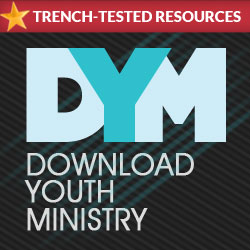I grew up on the proclamational form of church. This is where the one on the mic speaks. The crowd listens- usually with notes of some kind that the speaker wrote. I’ve done ministry like this for literally decades. I still love it sometimes- especially when the communicator and the message are dynamically delivered. But last year, something flipped in me and I said, “this is not working in our high school ministry anymore”.
Dynamic messages are not necessarily transformational. It’s time to ditch this model for my students.
But if I’m going to stop talking at students and seriously start engaging them in the learning process, then some significant things are going to have to change. If I want to put my money where my mouth is and stop telling students what to think and actually engage them in the process of learning how to think, then this will require some significant shifts. I can no longer delegate an interactive learning style to the small group setting only.
Here’s 3 I’m in the midst of:
CREATE SPACE FOR QUESTIONS AND CONVERSATION.
I’ve never done youth ministry without one staple in my weekend program. It’s always been (and still is) called, “the mingle”. It’s some silly or significant question that students ask/answer during a fairly unstructured conversation space in our program. Sometimes it’s about some culture thing like the superbowl. Sometimes it’s a light intro to the topic of the hour or so we’re together. Currently, it’s when we also encourage students to get a drink from our deck cafe and welcome anyone who is new too.
But lately, I’ve decided that’s not cutting it either. So I’ve added having students engage one another in conversation 3-5 times during a 35 minute talk. Most of the time it’s a multiple choice question that is answered in 2 minutes or less. Sometimes it’s deep. Sometimes it’s silly. I try and make them safe and when asking for deeper stuff, I usually ask them to talk about “teens today” instead of “struggles they each can identify with”. But if I don’t break up the convo and have students start interacting with one another and the adults around them, then in this season of my student ministry, I’m pretty sure we’ve missed it.
I don’t know that we’re there yet, but it’s a start. Here’s 3 examples of questions I asked last weekend.
INSTIGATE A TENSION TO BE WRESTLED WITH.
DON’T LET ANYONE SIT ALONE.
Lastly, if I don’t want students to sit and listen and not engage God or me or anyone in the tension, then I can’t let them sit by themselves. We sit around smallish cafe tables already- with like 4-6 students or so at them. But that doesn’t stop someone from trying to nab a table to themselves. Which we are slowly trying to outlaw in our ministry. As best we can, we are working to make it totally taboo in our environment to come and be alone in our space.




 Husband. Dad to 5. Student Ministry Pastor. Follower of Jesus. Yatta yatta.
Husband. Dad to 5. Student Ministry Pastor. Follower of Jesus. Yatta yatta.



This is some incredible stuff. I’ve incorporated “mingle time” into my high school program, and it’s been a phenomenal shift; both students and volunteers have commented on how much they enjoy it. It’s absolutely possible to have spontaneously deep conversations with students. They just need the space and environment for it to happen.
LOVE the post. I think you really have some great, practical wisdom in here. I am going to try “the mingle” in our group. Thank you for sharing.